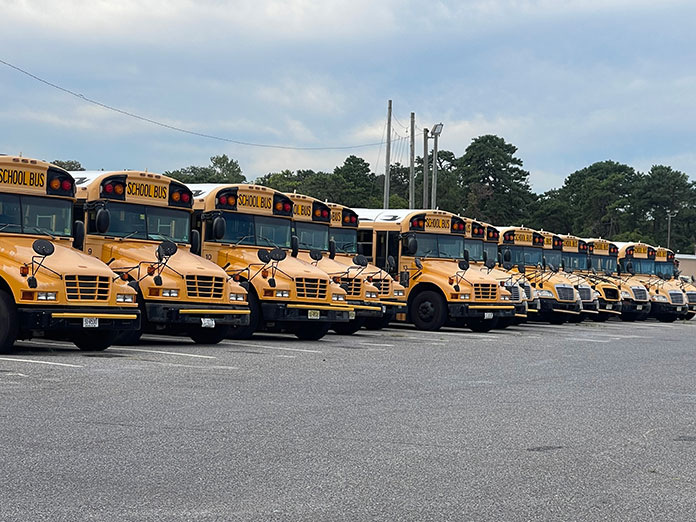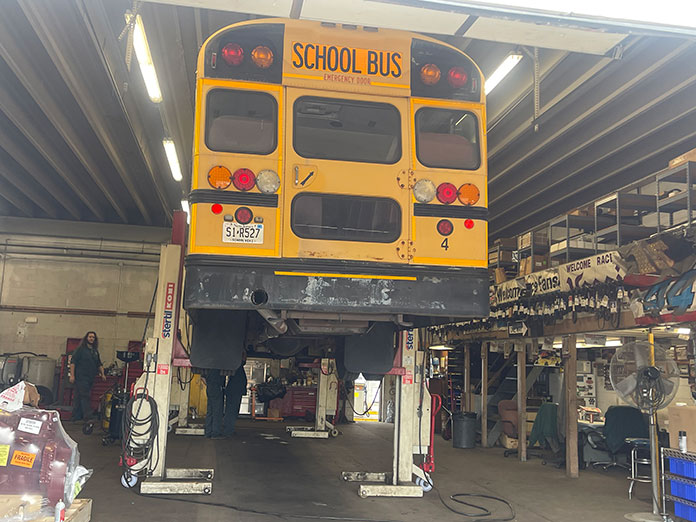
BRICK – The transportation needs of some 9,020 township students changes from week-to-week, day-to-day, and sometimes even hour-to-hour.
Transportation Supervisor Dr. Peter Morris oversees an annual budget of about $9.8 million. In light of cuts to school funding under the S-2 bill, which reduced the district’s state funding by millions of dollars, the department is pressured to run as “lean and mean” as it possibly can, he said.
Student transportation has a lot of nuances, Morris said. “It’s dynamic, it’s based on individual need, (Individualized Education Plans), programs, life circumstances…so as far as the role of transportation, everything that happens in public education starts and ends with quality transportation every day,” he said.
Individual students have various needs. Some of the 423 special education students in the district need wheelchairs, some need aides and some even need nurses during transportation, which is provided to them, he said.
The district participates in “jointures” with other districts whenever possible, and works with Monmouth Ocean Educational Services Commission (MOESC) to coordinate cooperative transportation to share bus runs with other districts, he said.
The Brick School District runs 660 regular education bus routes, plus another 60 to 70 out-of-district routes, “but it’s fluid,” said Morris. “It changed this morning.”
667 of the township students attend and are bussed to non-public or charter schools, except for 105 of them who receive an “aid in lieu” payment of $1,065 per student when their families provide their own transportation.
For the 2022-2023 school year, Brick had 3.2 million student transports at the cost of $4.44 per student per day, Dr. Morris said, which does not even include class trips, band runs, sporting events, and other extracurriculars.
Brick even provides transportation to 55 homeless students, which could be the result of a social issue, a court issue, their family being displaced or a variety of other circumstances, Morris said.
“They are all individual cases,” he said. “They are bussed to their home school district prior to them having some type of family upheaval – they could be in north Jersey, south Jersey – we are responsible for their transportation.”

The Brick school district transports all students who live one to 20 miles from their school for elementary and middle school students, and 1.5 miles to 20 miles for high school students.
The transportation department utilizes an automated administrative software system to help with the bus routing and bus stops, Morris said.
The school transportation budget includes the oversight and maintenance of 170 vehicles which includes 110 buses, and another 60 vehicles that includes vans, cars, plows, tractors and trucks.
The district also employs six full-time mechanics.
There are enough full-time bus drivers to start the school year – who receive healthcare and benefits – but career bus drivers are an aging out population, and people are not going into the profession, Morris said.
He said there are other options for full-time jobs with health benefits, like big box stores. School bus drivers need a CDL (Commercial Driver’s License) and physicals. Substitute drivers, who make $23 an hour, must also have their CDL and a physical.
“That is where the storm is: you have a shortage of drivers, nationally, and then on top of that you have S-2 funding cuts, so when bus drivers call out you don’t have people to cover those runs.”
Providing transportation services in the upcoming school year is going to be particularly difficult because of the lack of substitute drivers, and the “squeeze” of S-2 funding, Dr. Morris said.







